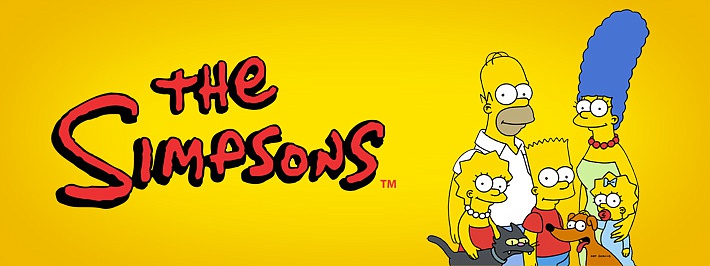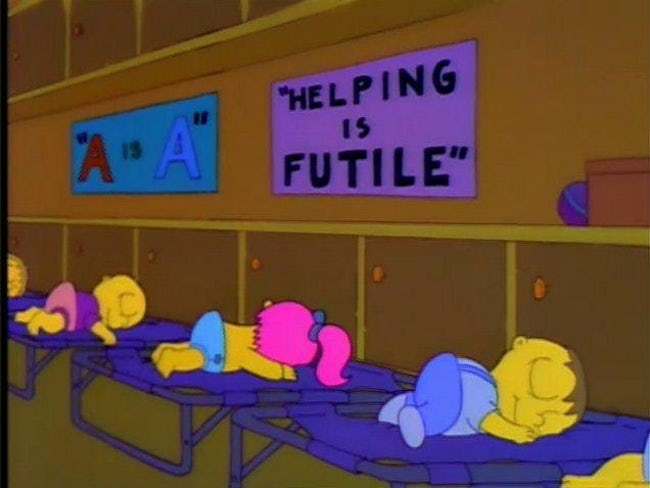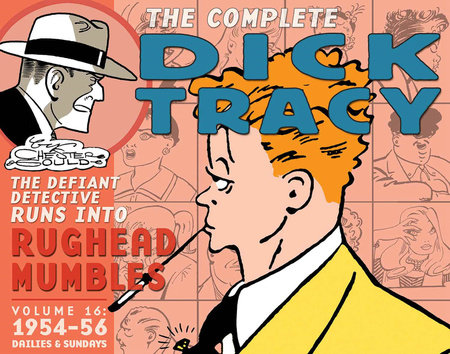Jokes and references from the Simpsons in English, which need to be explained

Today let's talk about cartoons. And specifically - about the longest animated series in the history of mankind - "The Simpsons".
The authors of the series do not hesitate to touch on the most topical and controversial topics like religion, political correctness, same-sex marriage, and feminism. Actually, this is one of the reasons why the Simpsons are so famous.
')
Another reason is great humor and a variety of references. When translating into other languages, some of them lose their meaning, so we consider the original jokes and references that are really worth attention. Go!
Sneed's Feed & Seed
Season 11, Episode 5
Name: EIEI-D'oh
In the episode, when Homer decided to revive his family farm, he drove into a village shop to buy various tools for gardening.
Store name: "Sneed's Feed & Seed (formerly Chuck's)." In the Russian dubbing, the name was translated as "Names and Seeds." In the rhyme, but lost quite an interesting joke, which is not difficult for a non-native speaker to notice.
We see that the words Sneed, Feed, Seed rhyme among themselves. The name is translated as "Snead's Feed and Seeds." So where is the joke?
Below it says “Formerly Chuck's” (formerly Chuck). In a native speaker, the first two rhymes to the word Chuck will be Fuck and Suck. Quite a greasy pun, but that does not cease to be interesting.
By the way, the title of the episode “EIEI-D'oh” is a link to the famous children's song “Old McDonald had a Farm”. True, in the end, the sound O was replaced by the original Homeric D'oh.
Rashomon
Season 10, Episode 23
Name: 30 Minutes Over Tokyo
In the episode “30 minutes in Tokyo”, the Simpsons fly to Japan. And on the plane, Homer and Marge have a very interesting dialogue.
Marge: C'mon, Homer. Japan will be fun. You like Rashomon.There is hidden direct reference to the Japanese Oscar-winning film "Rashomon" or "Rashomon" of 1950, filmed by Akira Kurosawa. In this film, for the first time in the history of cinema, the same event was shown from the point of view of different characters. And Homer's phrase speaks about it directly.
Homer: That's not how I remember it.
The reference is pertinent, the series is about Japan, and rather unobvious, because only the one who watched the movie itself will understand it.
But in the dubbing this reference was completely removed. It was replaced by a neutral dialogue:
Marge: God, Homer, Japan is a good country. You love their movies.
Homer: I don't remember a single one.
Sorry, Akira-san, but the dubbing studio seemed to find the reference to your movie too complicated.
Ayn Rand School for Tots
Season 4, Episode 3
Name: A Streetcar Named Marge
In almost every episode of The Simpsons, hidden references to famous people are hidden. In the series Tram named Marge, the authors made a rather direct reference to the work of Ayn Rand, an American writer and author of the popular books Atlant Attended Shoulders and Source.
The name of the writer called the nursery "Ayn Rand School for Tots", but this is not the only reference.

On the walls in the manger you can see posters with the words “A is A” and “Helping is Futile”. This is also a reference to the work of Rand.
“A is A” (A is A) is the name of the third part of the book “Atlas Shrugged” and the basic postulate of the philosophy of objectivism, which Rand described.
Helping is Futile (Help is meaningless) is one of the basic life principles of Danny Taggart, the main character of Atlanta. She was convinced that it was pointless to help another, because help makes a person weak.
True, what do these inscriptions in the manger? The question remains open.
And yes, the Russian dubbing again distinguished itself. “Ayn Rand School for Tots” they translated as “Nursery.”
Brevity is ... wit
Season 3, Episode 2
Name: Mr. Lisa Goes to Washington
There is a very interesting joke in the series “Lisa Goes to Washington”. The phrase “Brevity is ... wit” is written on the banner of the essay contest.
To understand this reference, you need to know well the work of Shakespeare. In the play "Hamlet" says the phrase "Brevity is the soul of wit", which means "brevity - the soul of the mind." In the translation, you can even use the more familiar expression of Chekhov, “Brevity is the sister of talent”.
Here are just a banner this very phrase ... reduced. It's ironic, isn't it, is it?
Now i see why they call you miss hoover
Season 25, Episode 18
Name: Days of Future Future
In the series “Days of the Future of the Future” the Simpsons find themselves in 2044. After parting with his girlfriend, adult Bart embarks on all grave and sleeps with everyone.
During one of these scenes, there is a subtle but very vulgar joke, which, unfortunately, cannot be accurately conveyed in Russian.
In the Russian-language fragment, it is completely unclear why it was Bart who now understood the origin of the name Miss Hoover.
The original will shed some light:
- Wow! Now I see why they call you miss Hoover. You must be vacuuming for an hour.Hoover is one of the well-known American companies that manufactures vacuum cleaners. And “vacuuming” means not only “vacuuming”, but also “sucking off”.
- Anything to please my man.
Even a real vacuum cleaner in the foreground does not save from ambiguity. And Miss Hoover, apparently, really corresponds to his last name, since Bart is so pleased.
Here is such an interesting and vulgar pun from the writers.
No soap, radio!
Season 4, Episode 3
Name: Homer the Heretic
Right in the bath at the Simpsons, a radio is installed, on which there is an incomprehensible inscription: “No soap - radio”. And this joke has a pretty deep history.
Her story began in New York in the 1950s. A group of psychologists investigated the influence of mass thinking and conducted an experiment with ordinary people.
The point of the experiment is to track how the reactions of other people to a stupid joke affect the reaction of an individual.
Here is the experiment itself: one person told a joke. Here is the most popular version of this joke:
“The elephant and the hippopotamus were taking a bath. And the elephant said to the hippo, 'Please pass the soap.' The hippo replied, 'No soap, radio.' ”Several people who were aware of the experiment, after listening to the joke, began to laugh uncontrollably. And the man had a dilemma: pretend that he understood the anecdote, and laugh with everyone, or express bewilderment, while at the same time afraid to appear silly.
Translation: “The elephant and the hippo take a bath. The elephant says hippo: "Pass the soap, please." And the hippopotamus replies: "No soap - radio."
Psychologists estimated how many people would respond with a laugh to a silly joke, and how many - no. And exactly how they will do it. This was the basis of their study of mass thinking.
Soon this phrase turned into prank - children often made phone calls to unfamiliar numbers and joked like that. The phrase "No soap, radio" has become synonymous with senseless and merciless, stupid jokes. There was even an attempt to launch a humorous show with the same name, but it failed.
Multipliers just took a well-known "joke" and literally drew it - like a radio in the bathroom. So not everything is as simple as it may seem at first glance.
PS The song Homer is trying to sing in the bathroom is Tom Jones - Delilah (1968).
Prisoner 24601
Season 5, Episode 1
Name: Homer's Barbershop Quartet
One of the most chic and not obvious references is hidden in the flea market, where the residents of Springfield buy and sell all sorts of used things. The school principal, Mr. Skinner, found an incomprehensible helmet with the inscription “Prisoner 24601” and explained that he had spent two years in captivity with Viet Cong.
Interestingly, the exact same number was worn by Jean Valjean - the hero of Victor Hugo's book “The Miserable”. In the same way, he spent many years in prison, but he managed to escape and subsequently became a respected man, a businessman and a philanthropist in the city, living under an alien person.
Skinner is also considered to be a respected person in the city, and when meticulously examining his fate, it is a little like the life of Jean Valjean. It is doubly ironic that his demeanor strongly resembles Inspector Javert, a man who tried to catch Valjean when he was a fugitive criminal, and was extremely suspicious of him when he was the mayor of the city.
By the way, this number met in the Simpsons several times.
As the character's prison number under the name Koverny Bob (or Sayshow Bob)
Like Marge's prison room when she got caught stealing alcohol at the Abu supermarket. True, the episode when the number is clearly visible is very short.

Ahoy-hoy
Season 7, Episode 17
Name: Homer The Smithers
Who knows how old Mr. Burns is, but he is really old. Jokes about his age - this is the business card of the animated series. And sometimes they go pretty entertaining.
Have you ever paid attention, as Mr. Burns greets you by phone? For this, he uses the phrase “Ahoy-hoy”, rather than the usual “Hello”. And this is not a notion of screenwriters, but quite a tangible reference to a real historical character.
Alexander Graham Bell, after patenting the telephone in 1876, suggested this phrase as the standard greeting for starting and ending a telephone conversation. Mr. Burns is so old that he started using the phone even before the usual “Hello” came into fashion.
Although in recent seasons, the writers revealed his birthday of Mr. Burns - September 15, 1920, but at the same time in the earlier episodes there are lots of jokes that hint that in fact the age of the billionaire is much greater.
For example, in one of the series, he claims that he is 7-8 years older than Theodore Roosevelt. Roosevelt was born in 1858. So the question of age still remains open.
Dick Tracy and Ned Flanders
Season 8, Episode 8
Name: Hurricane Neddy
We know Ned Flanders as a calm, kind and to the extreme religious person, but this was not always the case. In childhood he was still a daredevil.
Little, who breaks into the room and mutates other children, is just Ned. And during a fight he says a very interesting monologue:
'Wheee! I'm dick tracy! Bam! Take that, Pruneface! Now I'm Pruneface! Take that, Dick Tracy! Now I'm Prune Tracy! Take that Di-- ''What is so interesting? Dick Tracy is the hero of the same-name comics popular in the second half of the 20th century, and Prunfeys is one of the main villains of the series. Alternately, the boy presented himself to one or the other.

Now I'm Prune Tracy! Take that Di–And then Ned took one part of the name of the main character and one part - the main villain. Prune Tracy is out . And by analogy, the second name should sound like Dickface . And this is a rather rude curse in English, the softest meanings of which are “asshole” and “stupid”. True, the tutor understood in time what would happen and prevented the situation when Ned began to speak the second “name”.
This childhood episode will allow viewers to take a different look at Flanders, right?
findings
The Simpsons is a great cartoon series, each episode is crammed with jokes, references to famous personalities, works of art, literature, cinema and historical events.
In one series of such "easter eggs" there can be more than fifty, considering that the series itself lasts a little more than 20 minutes.
And we strongly recommend that you watch “The Simpsons” in the original, because when dubbing, up to 80% of the chic jokes and references that make this cartoon so interesting are lost.
EnglishDom.com is an online school that inspires learning English through innovation and human concern.

Only for Habr's readers - the first lesson with a teacher on Skype for free ! And when you buy 10 classes, specify the promo code goodhabr2 and get another 2 lessons as a gift. The bonus is valid until 05/31/19.
Get 2 months of premium subscriptions for all EnglishDom courses as a gift .
Take them right now on the link
Our products:
Learn English words in the ED Words mobile app
Learn English from A to Z in the ED Courses mobile app
Install the Google Chrome extension, translate English words on the Internet and add them to the study in the Ed Words application
Learn English in the form of an online simulator
Consolidate conversational skills and find friends in conversational clubs.
Watch the video lifehacks about English on the YouTube-channel EnglishDom
Source: https://habr.com/ru/post/446364/
All Articles